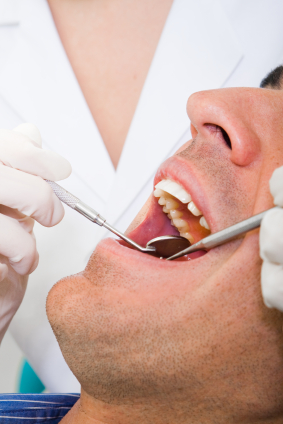Gluten at Your Dentist? Many dental products contain that pesky allergen.
 Wednesday, October 2, 2013 at 6:30PM
Wednesday, October 2, 2013 at 6:30PM  Elisabeth Veltman, The Tender Foodie tagged
Elisabeth Veltman, The Tender Foodie tagged  gluten-free dental floss,
gluten-free dental floss,  gluten-free dentistry,
gluten-free dentistry,  gluten-free toothpaste
gluten-free toothpaste  Email Article
Email Article  Print Article in
Print Article in  Celiac Disease,
Celiac Disease,  Doctor Visits,
Doctor Visits,  Health
Health  You, The Gluten Detective
You, The Gluten Detective
When you are first diagnosed with a food allergy or with an auto-immune disease that is triggered by food, such as celiac disease, the path to removing an allergen seems fairly obvious, especially when it comes to gluten. You remove bread and pasta. Then you start reading labels. Then you start looking up words. You, or your child/mother/sister/brother/husband... begin to feel better and stop having reactions until one day, another reaction occurs and you have no idea "what you did wrong." After you finish flogging yourself, you become a detective and go through the list:
1. What did I eat?
2. When did I eat it? Could I have a reaction that wasn't immediate? Did I make a mistake today or was it several days ago with something new?
3. Could I have developed an allergy or sensitivity to something new (here's a list of the different types of food reactions)?
4. What did I do wrong? Could it be somewhere that isn't obvious (read the list of surprising place for hidden gluten here)?
If you are allergic to gluten, have gluten sensitivity, or have celiac disease, your detective work centers around that pesky composite of gluten proteins (glutenin & gliadin) found in wheat, rye, barley, triticale, spelt, and some other grains. Your beauty cabinet is your next suspect, because you had heard that gluten can get into your eyes, nose, and mouth through cosmetics and personal care products (read more about cosmetics here). Supplements and medications are next - could they contain gluten? Yes they can (read more about supplements and medications here).
BUT THE DENTIST?
Common Gluten-Containing Products in Your Dentist Office (& in Your Home)
I began suspecting that gluten was in my toothpaste because I would wake up about an hour after I went to bed with my heart racing, my intestines, spine, and knuckles swelling, and I wondered what on earth I could have eaten. I did my detective work and found that toothpaste commonly cotains gluten, but it is not found in common language on the label. I switched to Desert Essence gluten-free toothpaste and felt relief immediately.
But after a few days, I had the same thing happen. At 10pm I was tired and ready for bed. I was relaxed and felt like I could sleep for a fortnight. I brushed wtih gluten-free toothpaste, then I flossed with minted dental floss. I'd go to bed and wake up an hour later - again with heart racing, intestines and joints swelling. I went through every possible scenario and the ONLY item that went into my mouth or any other mucous membrane that I had NOT thoroughly researched was the dental floss. I stopped using the dental floss and the next night slept like a baby and after two nights woke up swelling-free.I now use unflavored, unwaxed dental floss and that seems to be fine.
This also made me stop to think. What about the dentist? I always feel pretty crappy after a dental cleaning. I've been avoiding the dentist and it could be for a number of reasons, but I've learned to listen to my intuition - something is making me sick at the dentist.
In my next step of detective work, I found that gluten lurks in many common dental products:
1. Toothpaste
2. Flavored polishing paste
3. Topical anesthetic
4. Fluoride commonly used in many dentist offices
5. Dental Gloves: Make sure they are not powdered. They can be powdered wtih starch, usually starch that contains wheat or could be corn starch cross contaminated with wheat.
6. Dental Floss: unwaxed and unflavored flosses are your best bet, but double check that your dentist has gluten-free floss.
7. The Dentist Mask: the mask itself might not contain gluten, but your dentist may not change the mask between patients and after using gloves that contain gluten. Just request that the mask be changed before your dentist and the assistant put on their gloves and treat you.
8. Clean Hands: Most dentists, of course will wash their hands before putting on their gloves and before treating you. Just make sure that your dentist understands that after handling a potentially gluten-containing product, that he/she and the assistant need to wash their hands before handling anything that they use for you.
9. Orthodonic Retainers & Bite Splints: A new case study found that a girl was having trouble going into remission from celiac disease because of her retainer. Gluten is a common additive in plastics. Read more about this study, here.
10. Mouthwash: some mouthwashes - at the dentist and at home, contain gluten. Dental products are not regulated by the FDA, like food is (although tye should be they are going in our mouth!!), so gluten may not be disclosed in the ingredients.
The Moral of the Story?
Check with your dentist before your next visit to see if they are "gluten literate." In other words, do they know, without a doubt, what ingredients are in the products that they use? Do they treat patients with celiac disease and gluten allergies? Gluten might not appear in the ingredients, since by law it does not have to for these particular products (yet). If your dentist office isn't able to or won't properly research the ingredients, ask for alternatives, or find a gluten-free dentist.
As I was working on this article, I ran across another today (serendipity) about a dentist in Boulder Colorado who specializes in gluten-free dentistry! God bless Boulder, they are the good guys on the cusp of many a food fight. Maybe there is a gluten-free dentist in your town. I'm working on my own dentist right now to see if he can accommodate those of us with food allergies and celiac disease. People might laugh at a sign reading, "Gluten-free Dentist" but there are a lot of us who need one!
Companies Who are Claiming Gluten-free Status
(This list was begun on 10/29/2013. Please use this as a guide, but double check everything yourself against your own allergies & needs. Sometimes companies change formulation or policy, and The Tender Foodie may not be aware of this. Thank you!)
- Oral B Dental Floss
- Oral B Stages Toothpaste (does not say anything about other toothpaste lines)
- Desert Essence Toothpaste
UPDATES
Update 3/4/2014: Here is a post on Triumph Dining indicating that the study findings were not conclusive - that the plastics in the retainer material may not leach out enough over time to cause alarm.Two dieticians, Amy Jones, MS, RD and Tricia Thompson, MS, RD, contacted the lead author of the study and came to this conclusion:
The original study led the dietitians to contact the lead author. After discussing, both were still not convinced of the retainer’s guilt in the diagnosis. Due to the half life of tTG (which is 6 months) and an outdated report on the contents of methylmethacrylate (from 1971), Amy Jones and Tricia Thompson concluded that “enough gluten would leach from the retainer to cause an increase in tTG levels seems a bit extraordinary.
This may put some fears to rest, but this will be an interesting study to follow.


Reader Comments (12)
Thanks,
Connie
Check out this link - according to Oral B - their dental floss does not contain gluten. And yes, it is tough to find unflavored floss these days! When I find it, I scoop it up. Because dental products are not governed by the FDA, which is the agency that has developed the gluten and other food allergy requirements/laws, its tough to know exactly what they mean by "contains no gluten." But it is a comfort to know they are claiming this on their site.
Here is the link to OralB-s site:
http://pggillette.custhelp.com/app/answers/detail/a_id/8848/p/349/session/L3NpZC9ybkVpdypEbA%3D%3D
A week ago I had work done in preparation for a crown. Afterwards my mouth broke out in a rash of blisters around the temporary crown on both sides of the tooth. The sore was much bigger and more painful than usual. I talked to the dentist about it, but I didn't think about gluten in the topical anesthetic or the cement for the temporary crown.
It is really frustrating and depressing when all my effeorts to stay gluten-free go down the drain like this. The fatigue, depression and brain fog have been severe since my appointment. I'm almost afraid to go back to be fitted with the permanent. crown.
Thanks for your question. This might help:
I asked my dentist to go through every single thing that they use when they clean my teeth or repair anything in my mouth, as I had the same issues. He did so, and was able to choose products that did not contain any of my allergens, even traces after products had been distilled or processed. My chart has all of these products clearly noted, so that if I go in for a cleaning or filling, he and the technicians know what to do. They also tell me before they use anything what they are using so I can have the confidence that they are remembering not to use products with my allergens. I love my dentist for this (seriously love him), and there are other dentists out there who will do the same. It is a very good protocol. There were 2 manufacturers that I called myself because there was an ingredient that wasn't clear, and it wasn't clear if it was a gluten-free factory, and I have an allergy to tapioca. The dentist gave me the phone numbers for these 2 companies, but the dental office did 99% of the checking themselves. Products come in "lines" so that makes it easier, because there are dental companies who produce gluten-free products specifically for dentists.
Once we got organized, I now leave the dentist without a reaction! If your dentist won't do it, there are others who will.
Let us know how it goes if you have this conversation with your dentist, ok?
elisabeth